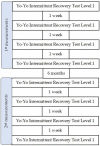Performance in the Yo-Yo Intermittent Recovery Test May Improve with Repeated Trials: Does Practice Matter?
- PMID: 37367239
- PMCID: PMC10299562
- DOI: 10.3390/jfmk8020075
Performance in the Yo-Yo Intermittent Recovery Test May Improve with Repeated Trials: Does Practice Matter?
Abstract
The Yo-Yo Intermittent Test is frequently used to monitor changes in athletes' performance in response to different interventions. However, the question remains as to whether, and to what extent, retakes of this test would contribute to these changes. This case study sought to determine the magnitude of practice effects, involving test repetition, on performance in the Yo-Yo Intermittent Recovery Test. A recreational soccer player performed four attempts of the Yo-Yo Intermittent Recovery Test-Level 1 (YYIR1) with a week's rest in between. The same participant repeated this test protocol (four attempts of the YYIR1) again after six months. Changes in distance covered, level achieved, maximal oxygen uptake, and heart rate between the first and last attempt were assessed. The smallest worthwhile change (SWC), the coefficient of variation (CV), and the 2CV were calculated to identify a trivial, a possibly meaningful, and a certainly meaningful change in YYIR1 performance. The distance covered in the first set of measurements increased from 1320 m to 1560 m (15.4%), which corresponds to a 4.6% increase in the level achieved (from 16.6 to 17.4). Similarly, the distance covered in the second set of measurements increased from 1280 m to 1560 m (17.9%), which corresponds to a 5.5% increase in the level achieved (from 16.5 to 17.4). The participant's performance changes fell outside of the SWC and the CV, but not the 2CV during both sets of measurements. These improvements in YYIR1 performance may be ascribed to practice with repeated attempts of the test by improving running technique at the turning point and/or by simply increasing the linear speed. This fact should always be kept in mind when interpreting the effects of training. Practitioners should differentiate between practice effects associated with repeated test execution and adaptation induced by conducting sport-specific training.
Keywords: Yo-Yo Intermittent Recovery Test; distance covered; learning effect; performance level.
Conflict of interest statement
The authors declare no conflict of interest.
Figures
References
-
- Karsten B., Larumbe-Zabala E., Kandemir G., Hazir T., Klose A., Naclerio F. The effects of a 6-week strength training on critical velocity, anaerobic running distance, 30-m sprint and Yo-Yo intermittent running test performances in male soccer players. PLoS ONE. 2016;11:e0151448. doi: 10.1371/journal.pone.0151448. - DOI - PMC - PubMed
Publication types
LinkOut - more resources
Full Text Sources


